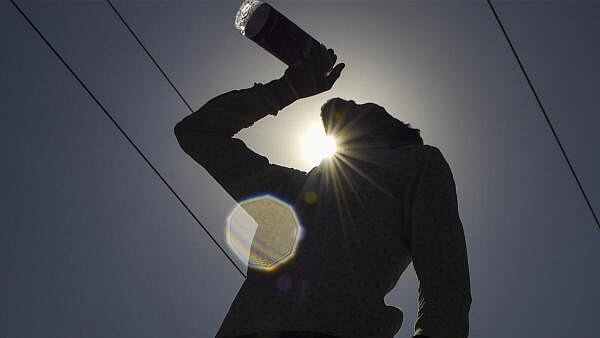
A man drinks water to quench his thirst.
Credit: PTI PHoto
New Delhi: The Centre on Thursday urged states to align their MGNREGA plans with the recent decision mandating dedicated expenditure on water-related works, including recharge, water harvesting and source protection.
It also called for the creation of 'Protected Drinking Water Zones', enforcement of inspection protocols and stronger community vigilance through Village Water and Sanitation Committees (VWSCs).
This issue was discussed in the second edition of the 'District Collectors' Peyjal Samvad', organised by the Department of Drinking Water and Sanitation (DDWS) under the Ministry of Jal Shakti. The event, which was held virtually, was aimed at strengthening local water governance and promoting source sustainability of the Jal Jeevan Mission (JJM).
The event brought together over 800 participants, including district collectors, mission directors and state teams.
Addressing the session, Additional Secretary and Mission Director of the National Jal Jeevan Mission (NJJM) Kamal Kishore Soan urged deputy commissioners of districts to integrate water conservation and recharge activities into their MGNREGA planning.
A new Decision Support System (DSS) developed in collaboration with BISAG-N was also presented at the event. The digital tool integrates hydro-geomorphological, climatic and spatial data to help districts scientifically assess and protect water sources, prepare District Source Sustainability Action Plans (DSSAPs) and monitor progress through digital dashboards.
Director (NJJM) Y K Singh said that while 81.21 per cent of rural households now have tap water connections, around 85 per cent of the rural drinking water demand still depends on groundwater, stressing the need for community-led scientific water management.
To ensure long-term source sustainability, it is exploring Honeycomb Technology-based rainwater harvesting systems to enhance groundwater recharge, according to an official statement.
A video from the Pattan area highlighted how the initiative has brought dignity and ease to women and children by ensuring access to clean drinking water.
In Bokaro, Jharkhand, the Jal Jeevan Mission has become a catalyst for women's empowerment and sustainable service delivery. Drawing water from six major rivers, the district runs surface water-based schemes supported by a robust operation and maintenance framework, the statement said.
